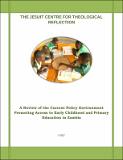A Review of The Current Policy Environment Promoting Access to Early Childhood And Primary Education in Zambia
Abstract
It is said that a successful implementation of any Early Childhood Education (ECE) programmes greatly depends on the availability of a comprehensive ECE policy. Sadly, for Zambia, fifty-two years after independence, the country has no comprehensive ECE policy to guide the practice. It is not surprising therefore that a majority 76 percent of children at grade 1 level are without ECE experience, rendering them vulnerable and unprepared for the formalised education system demands. On the other hand, the minority 24 percent with ECE experience are doted along the rail-line between Lusaka and Copperbelt
and in provincial centres, leaving most rural children unattended to. The immediate observable effect of having an educational system built on a weak ECE foundation is visibly seen through the very low completion rate currently at 30.8 percent (MoGE, 2015), ejecting out the 70 percent by the way-side by the time of completion at grade 12 stage. To a larger extent, the quality of education is compromised. Whereas Zambia has numerous policies and pieces of legislature in support of education, little is known regarding the various policies and their contributions to the ECE and Primary subsector. At the same
time, whereas stakeholders appear to concentrate resources on Primary Education sub-sector, it is not clear what policies and legislations are enabling or disabling the provision of quality education. Given the reality highlighted above, this study was commissioned with the following specific objectives in mind:
i) To identify policies that support early childhood and primary education in education.
ii) To identify gaps that lie in the current policies in the enhancement of access to early childhood and primary education.
iii) Identify challenges faced in the provision of early child childhood and primary education.
iv) To identify interventions that will increase access to early childhood and primary education.
v) To map out relevant stakeholders in promoting access to early childhood and primary education.
Description
This is a research report on a Review of the Current Policy and Legal Environment Promoting Access to Early Childhood and Primary Education in Zambia. In this study, we focus on the gaps that exist in the current policy and legal framework, as well as the identified challenges and suggested strategies to overcome the identified challenges for ECE and Primary subsector to thrive in Zambia. Emerging from the recent research study on Zambia citizens’ access to Economic and Social and Cultural Rights (ESCR) is a gloomy picture portraying more than 80 percent of children without access to Early Childhood Education. Ridding on the ESCR findings, this study then interrogates policies and related legal framework in the provision of education to the Zambian community. This study adopts a purposeful visit to selected institutions with access to policies and legal documents related to the topic championing ECE and Primary education in Zambia. The study adopts an interpretive research approach. Our central endeavour into the context of the interpretive research paradigm was to understand the extent to which the various policies and legal provisions are facilitating and/or disabling children to access education in Zambia. The findings from this study could form a basis for formulating an advocacy strategy to lobby for improved access to quality education at foundational stage.
